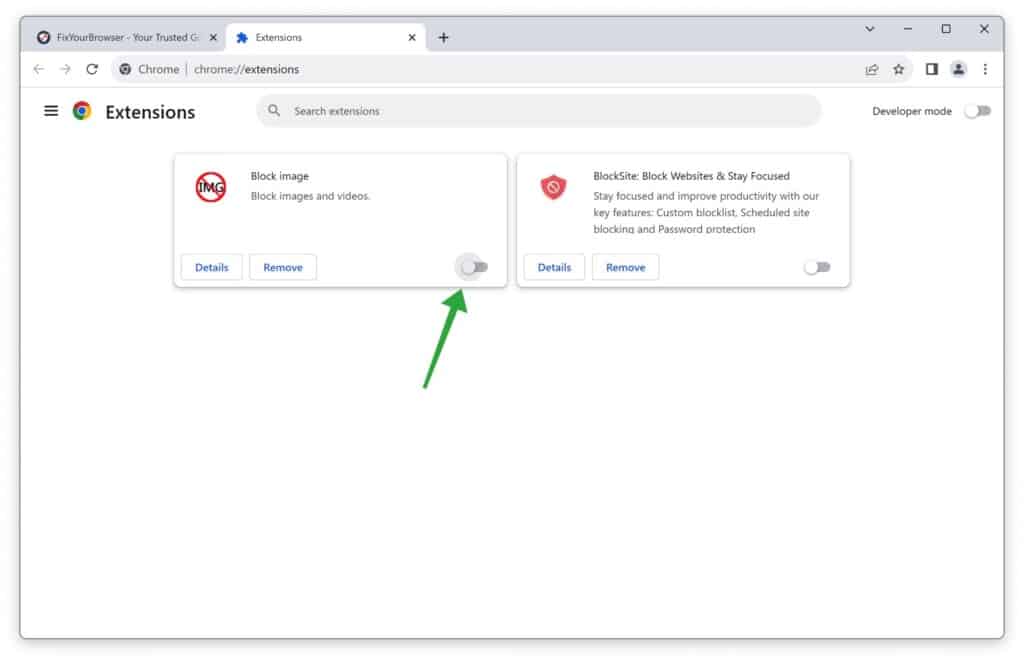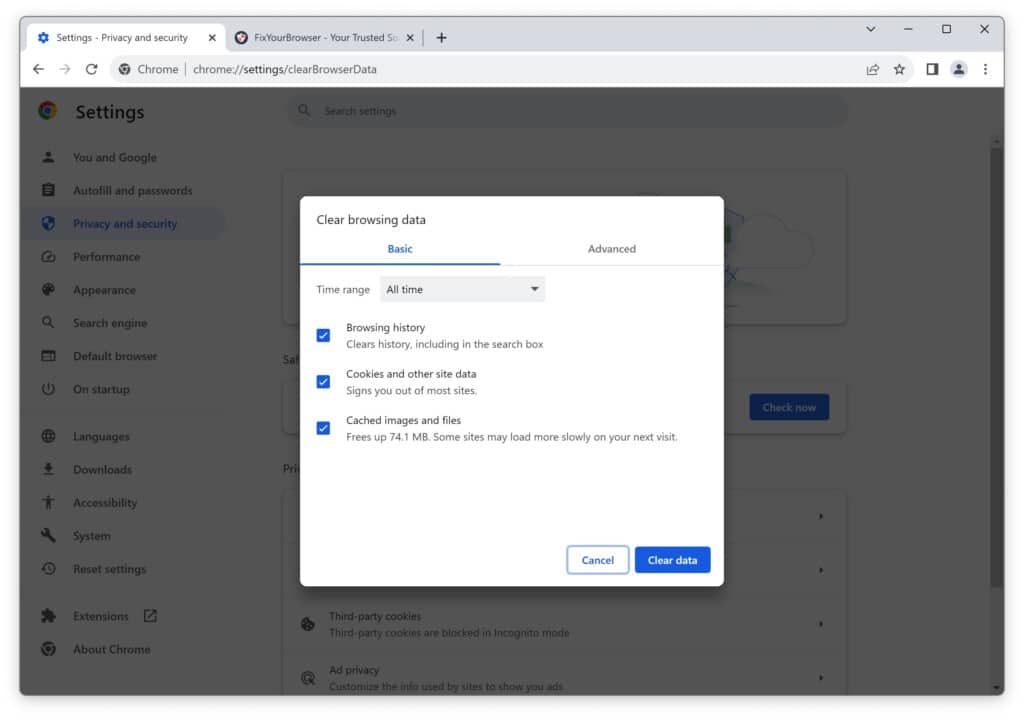More and more people are reporting a problem with the Google Chrome browser in that the screen goes black. This black screen in Chrome is a common problem with multiple causes.
In this article, I explain why the black screen occurs and what you can do about it to solve this problem. Learn more in this step-by-step guide.
Understanding the Chrome Black Screen Issue
What is Chrome Black Screen?
Chrome black screen refers to a common issue experienced by users of the Google Chrome web browser. It occurs when the browser window displays a black screen instead of the expected content. This frustrating problem can disrupt browsing activities and hinder productivity.
Causes of Chrome Black Screen
The black screen issue can occur due to various reasons. Incompatible browser extensions or plugins, outdated graphics drivers, or conflicts with other software are some common causes. When these issues arise, the browser fails to load the content properly, resulting in a black screen.
When Does the Chrome Black Screen Occur?
Users often encounter the black screen problem when launching Chrome or loading a specific webpage. It can happen suddenly without warning, leaving users puzzled and seeking a solution. The issue can affect both Windows and Mac users of the Chrome browser.
The Chrome black screen issue can significantly impact users’ browsing experience. It can lead to frustration, wasted time, and hindered productivity. Users may be unable to access important websites, complete online tasks, or even browse the internet leisurely. The problem can disrupt work and personal activities, causing inconvenience and annoyance.
Several troubleshooting steps can be taken to address this issue to resolve the Chrome black screen problem. These steps include disabling extensions, clearing the browser cache, updating graphics drivers, and running Chrome in compatibility mode. Some users have reported that disabling hardware acceleration in Chrome settings can help resolve the black screen problem.
Users need to keep Chrome and the operating system up to date to minimize the occurrence of the black screen problem. Regularly updating the browser and system ensures that any potential bugs or compatibility issues are addressed.
How to fix Google Chrome black screen
Google Chrome black screen refers to a common issue experienced by users of the Google Chrome web browser. It occurs when the browser window displays a black screen instead of the expected content. The black screen issue can occur for various reasons, such as incompatible browser extensions or plugins, outdated graphics drivers, or conflicts with other software. Users often encounter the black screen problem when launching Chrome or loading a specific webpage.
The Chrome black screen issue is a common problem faced by users of the Google Chrome web browser. It occurs when the browser window displays a black screen instead of the expected content. This can be frustrating and hinder your browsing experience. Fortunately, you can take steps to resolve this issue on Windows.
-
- Disable Extensions: Incompatible browser extensions or plugins can sometimes cause the black screen problem. To troubleshoot this, disable all extensions and check if the issue persists. If the black screen disappears, you can enable the extensions individually to identify the problematic one.
- Clear Browser Cache: Accumulated cache files can sometimes interfere with the proper functioning of Chrome. Clearing the browser cache can help resolve the black screen issue.
- Update Graphics Drivers: Outdated graphics drivers can also contribute to the black screen problem. Updating your graphics drivers to the latest version can help resolve compatibility issues. Visit the website of your graphics card manufacturer and download the latest drivers for your specific model.
- Run Chrome in Compatibility Mode: Running Chrome in compatibility mode can sometimes resolve compatibility issues with Windows.
- Disable Hardware Acceleration: Some users have reported that disabling hardware acceleration in Chrome settings can help resolve the black screen problem.
Here are the steps in more detail:
Disable Incompatible Extensions
One of the common causes of the Chrome black screen issue is incompatible browser extensions. These extensions and plugins can interfere with the normal functioning of Chrome and result in a black screen.
To troubleshoot this issue, follow these steps:
- Open Google Chrome and click on the three-dot menu icon in the top-right corner of the browser window.
- Select ” Extensions ” From the dropdown menu and click “Manage Extensions.”
- Disable all the extensions and plugins by toggling the switches to the off position.
- Restart Chrome and check if the black screen issue is resolved.
- If the issue is resolved, you can individually enable the extensions and plugins to identify the problems. Disable or remove the problematic extension or plugin to prevent future occurrences of the black screen problem.

Clear Browser Cache
Another potential cause of the Chrome black screen issue is a corrupted or overloaded browser cache. Clearing the browser cache can help resolve this issue.
Here’s how you can clear the cache in Chrome:
- Open Google Chrome and click on the three-dot menu icon in the top-right corner of the browser window.
- Select “More Tools” from the dropdown menu and click “Clear browsing data.”
- In the “Clear browsing data” window, select the time range you want to clear the cache. To clear the entire cache, select “All time.”
- Check the box next to “Cached images and files.”
- Click on the “Clear data” button to clear the browser cache.
- Restart Chrome and check if the black screen issue is resolved.

Update Graphics Drivers
Outdated graphics drivers can also contribute to the Chrome black screen problem. Updating the graphics drivers to the latest version can help resolve this issue.
Here’s how you can update the graphics drivers:
- Press the Windows key + X on your keyboard and select “Device Manager” from the menu.
- In the Device Manager window, expand the “Display adapters” category.
- Right-click on the graphics driver and select “Update driver”.
- Choose the option to search automatically for updated driver software.
- Wait for Windows to search for and install the latest graphics driver.
- Restart your computer and check if the black screen issue is resolved.

Run Chrome in Compatibility Mode
Running Chrome in compatibility mode can sometimes resolve the black screen issue, especially if you are using an older version of Windows.
Here’s how you can run Chrome in compatibility mode:
- Right-click on the Google Chrome shortcut on your desktop or taskbar and select “Properties.”
- In the Properties window, go to the “Compatibility” tab.
- Check the box next to “Run this program in compatibility mode for”.
- Select the appropriate operating system from the dropdown menu (e.g., Windows 8 or 7).
- Click on the “Apply” button and then “OK.”
- Launch Chrome and check if the black screen issue is resolved.

Disable Hardware Acceleration
Some users have reported that disabling hardware acceleration in Chrome settings can help resolve the black screen problem. Here’s how you can disable hardware acceleration:
- Open Google Chrome and click on the three-dot menu icon in the top-right corner of the browser window.
- From the dropdown menu, select “Settings.”
- On the left, in the “System” section, toggle off the switch next to “Use hardware acceleration when available.”
- Restart Chrome and check if the black screen issue is resolved.

Additional Tips and Workarounds
In addition to the troubleshooting steps mentioned above, here are some additional tips and workarounds that can help resolve the Chrome black screen issue:
- Keep Chrome and the operating system up to date to minimize the occurrence of the black screen problem. Regularly check for updates and install them.
- Check online forums and communities for solutions and workarounds from other users who have encountered the black screen issue.
- Visit the official Google support website for resources and assistance troubleshooting various browser issues, including the black screen problem.
By following these troubleshooting steps and utilizing the additional tips and workarounds, you should be able to resolve the Chrome black screen issue and enjoy a seamless browsing experience.
Update the Chrome browser
An outdated Chrome browser can sometimes contribute to the occurrence of the black screen error. It’s important to keep your browser up to date to ensure website compatibility and benefit from the latest bug fixes and security enhancements.
To update Chrome, follow these steps:
- Open Google Chrome.
- Click on the three-dot menu icon in the browser window’s top-right corner.
- Hover over the “Help” option in the dropdown menu.
- Select “About Google Chrome” from the submenu.
- Chrome will automatically check for updates and install them if available.
- Restart the browser to apply the updates.

Seek Help from Support Forums or Professionals
If you have exhausted the troubleshooting steps mentioned above and can still not resolve the black screen error, seeking help from support forums or professionals can provide valuable assistance. Here are a few resources you can consider:
- Support forums: Online forums dedicated to web development, browser-related issues, or SSL certificates can be a great source of information. Participate in these forums, describe your problem in detail, and seek guidance from experienced users or moderators.
- Professional assistance: In complex cases or situations where you lack technical expertise, consulting with professionals such as web developers, IT specialists, or cybersecurity experts can be beneficial. They can analyze the issue thoroughly and provide tailored solutions based on your circumstances.
Resolving the black screen error requires a systematic approach and may vary depending on the underlying cause. By following the essential precautions, additional troubleshooting steps, and seeking help from appropriate resources, you can increase the chances of resolving the error effectively.
I hope this helped. Thank you for reading!
Learn more:
